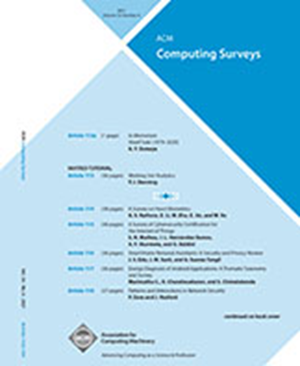A Survey of Quantum Machine Learning: Foundations, Algorithms, Frameworks, Data and Applications
IF 28
1区 计算机科学
Q1 COMPUTER SCIENCE, THEORY & METHODS
引用次数: 0
Abstract
Quantum machine learning combines quantum computing with machine learning to solve complex computational problems more efficiently than classical approaches. This survey provides an introduction to the foundations, algorithms, frameworks, data and applications of quantum machine learning, serving as a resource for researchers and practitioners. We begin by reviewing existing surveys to identify gaps that this work addresses, followed by a detailed discussion of the foundational principles of quantum mechanics and machine learning essential for quantum machine learning. Key algorithms are examined, highlighting their mechanisms, advantages, and applications across various domains. Current frameworks and platforms for implementing quantum machine learning algorithms are explored, emphasizing their unique features and suitability for different contexts. Existing quantum datasets for practical usage are also reported and commented on. This survey also reviews over 135 papers, categorized into theoretical and practical contributions, to identify key advances, limitations, and application areas within quantum machine learning. Critical challenges such as hardware limitations, error rates, and scalability are analyzed to detect the obstacles that must be addressed for practical deployment. By synthesizing these elements into a structured overview, this survey aims to serve as both an introduction and a guide for advancing research and development in this disruptive field.量子机器学习概览:基础、算法、框架、数据和应用
量子机器学习将量子计算与机器学习相结合,比经典方法更有效地解决复杂的计算问题。本调查介绍了量子机器学习的基础、算法、框架、数据和应用,为研究人员和实践者提供了资源。我们首先回顾现有的调查,以确定这项工作解决的差距,然后详细讨论量子力学的基本原理和量子机器学习所必需的机器学习。关键算法进行检查,突出其机制,优势,并在各个领域的应用。探讨了目前实现量子机器学习算法的框架和平台,强调了它们的独特功能和对不同环境的适用性。并对现有的实际应用的量子数据集进行了报道和评论。本调查还回顾了超过135篇论文,分为理论和实践贡献,以确定量子机器学习的关键进展,局限性和应用领域。分析了硬件限制、错误率和可伸缩性等关键挑战,以检测实际部署中必须解决的障碍。通过将这些要素综合成一个结构化的概述,本调查旨在作为一个介绍和指导,以推进这一颠覆性领域的研究和发展。
本文章由计算机程序翻译,如有差异,请以英文原文为准。
求助全文
约1分钟内获得全文
求助全文
来源期刊

ACM Computing Surveys
工程技术-计算机:理论方法
CiteScore
33.20
自引率
0.60%
发文量
372
审稿时长
12 months
期刊介绍:
ACM Computing Surveys is an academic journal that focuses on publishing surveys and tutorials on various areas of computing research and practice. The journal aims to provide comprehensive and easily understandable articles that guide readers through the literature and help them understand topics outside their specialties. In terms of impact, CSUR has a high reputation with a 2022 Impact Factor of 16.6. It is ranked 3rd out of 111 journals in the field of Computer Science Theory & Methods.
ACM Computing Surveys is indexed and abstracted in various services, including AI2 Semantic Scholar, Baidu, Clarivate/ISI: JCR, CNKI, DeepDyve, DTU, EBSCO: EDS/HOST, and IET Inspec, among others.
 求助内容:
求助内容: 应助结果提醒方式:
应助结果提醒方式:


